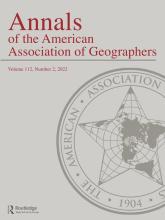The accelerated proliferation of geographic information systems (GIS), especially in the last decade, has greatly expanded the connotation of GIS technology from primarily a diverse suite of digital objects, representations, and devices that create or make use of geographical information to a mediated means with which we humans experience, explore, or make sense of the world. The research perspective of humanistic GIS is proposed to better encompass the expanded category of GIS technology as well as the opportunities and challenges that go with it. Deeply rooted in humanistic geography, humanistic GIS offers a coherent and systematic framework that integrates existing fragmented humanism-related GIS studies and reorients the epistemological foundation by situating GIS in its mediation of human experience. This epistemological configuration not only categorizes GIS through its embodiment, hermeneutic, autonomous, and background relations with the involved human and place but it also provides an analytical structure for examining the intertwined implications of a particular instantiation of GIS. This newly proposed humanistic perspective demonstrates a sincere quest to develop and use GIS in ways that will be more empathetic and better for humanity. Through this article, both the GIS and geography communities are called on to envision a humanistic pathway for the next chapter of GIS.
